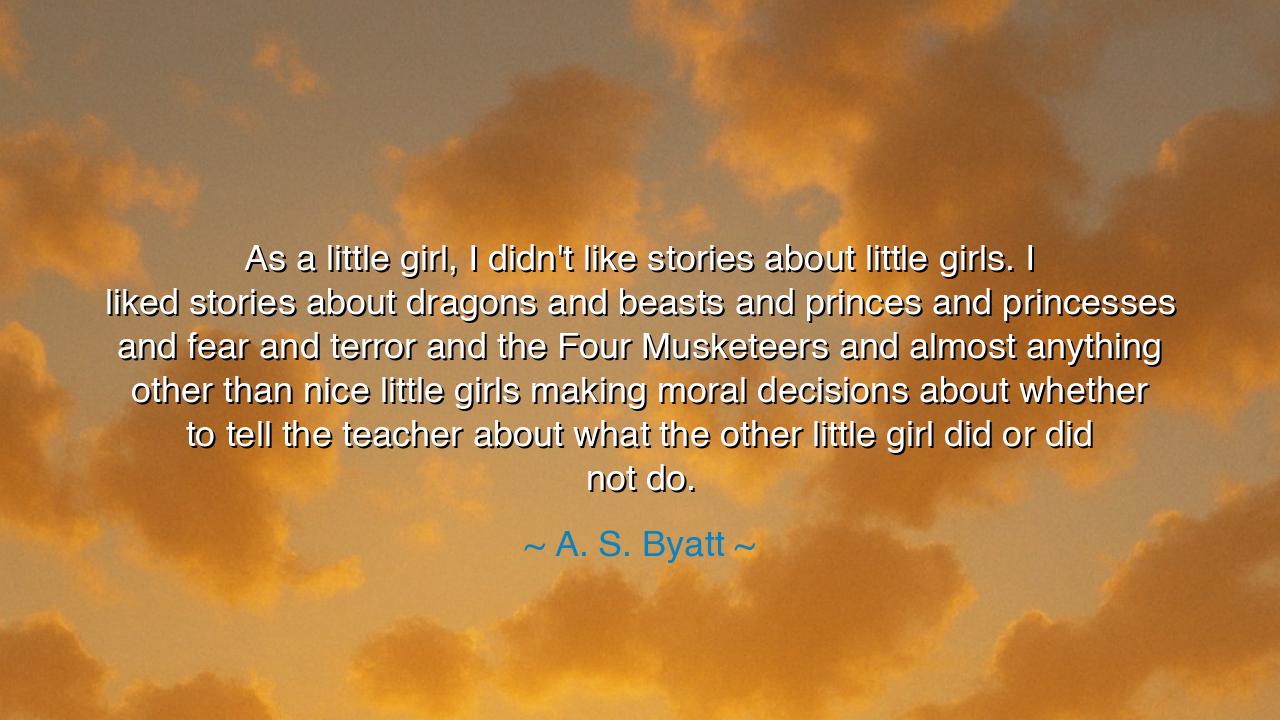
As a little girl, I didn't like stories about little girls. I
As a little girl, I didn't like stories about little girls. I liked stories about dragons and beasts and princes and princesses and fear and terror and the Four Musketeers and almost anything other than nice little girls making moral decisions about whether to tell the teacher about what the other little girl did or did not do.






A. S. Byatt once confessed: “As a little girl, I didn’t like stories about little girls. I liked stories about dragons and beasts and princes and princesses and fear and terror and the Four Musketeers, and almost anything other than nice little girls making moral decisions about whether to tell the teacher about what the other little girl did or did not do.” In this declaration, there is more than childhood preference; there is the voice of a soul that yearned for vastness, for danger, for mystery beyond the narrow boundaries of convention. Byatt’s rejection of tidy, moralistic tales reveals a longing for the epic—stories where courage is tested, where the heart beats faster, where the imagination takes flight.
The origin of this wisdom lies in Byatt’s own formation as a writer and thinker. As a child, she saw that the tales offered to her gender were small, confined to domestic spaces, to simple lessons about obedience and morality. But she craved more. She longed for the dragons, symbols of chaos and the unknown; for the beasts, embodiments of fear and strength; for the princes and princesses, figures of destiny and power. In choosing such stories, she embraced the wildness of imagination rather than the constraints of social instruction. Her words remind us that true growth does not come from comfort, but from confrontation with the grand and the terrifying.
The ancients knew this well. The Greeks gave their children the Iliad and the Odyssey, not tales of children deciding whether to obey their teachers, but of warriors, gods, monsters, and voyages across perilous seas. The Norse sang sagas of Thor and Loki, not of petty domestic quarrels. These stories did not only entertain; they shaped the souls of those who heard them, teaching them about fate, courage, terror, and the price of glory. Byatt, even as a child, instinctively reached for that same inheritance: stories that expand the soul rather than shrink it into safe morality.
History offers us vivid parallels. Consider Joan of Arc, a little girl who was not content with being bound to the domestic tales of her time. She dreamed of angels, battles, kings, and the salvation of her nation. Had she listened only to the stories offered to young women of her era—tales of obedience, duty, and silence—she would never have become a figure who shaped history. Instead, like Byatt, she embraced visions of grandeur, of fire and terror, of purpose beyond the smallness of her years. And though her life was short, her story still burns across the centuries.
The meaning of Byatt’s reflection is this: the imagination must be nourished with vastness, not only with safety. Tales of moral decisions have their place, but when they are the only fare given to young minds, they starve the spirit. Children, and indeed all people, need stories of dragons and beasts, of fear and triumph, of danger and wonder. These tales remind us that life is not only about small choices, but about vast struggles, and that within us lies the strength to face them.
The lesson for us is clear: do not fear the stories that challenge or unsettle. Seek them, embrace them, pass them on. If you are a parent or teacher, do not only offer tales of safety and tidiness—offer sagas, myths, and epics. If you are a seeker yourself, do not confine your imagination to what is polite or proper—reach for the dangerous, the mythic, the extraordinary. It is in these tales that courage is formed and vision expanded.
In practice, this means filling your life with stories that stretch your mind and heart. Read the epics, the myths, the sagas of different lands. Engage with art that unsettles as well as inspires. Do not limit yourself to the “nice little stories” of convenience, but embrace those that awaken the heroic within. For it is better to wrestle with a dragon in your imagination than to live forever in a cage of smallness.
Therefore, remember Byatt’s wisdom: “I liked stories about dragons and beasts… almost anything other than nice little girls making moral decisions.” Her words are a call to expand the soul, to embrace the heroic, to nourish the imagination with greatness. For in the end, it is the epic tales, not the tidy ones, that prepare us for the storms of life—and it is in facing dragons, even in story, that we learn to face the dragons of our own destiny.






AAdministratorAdministrator
Welcome, honored guests. Please leave a comment, we will respond soon